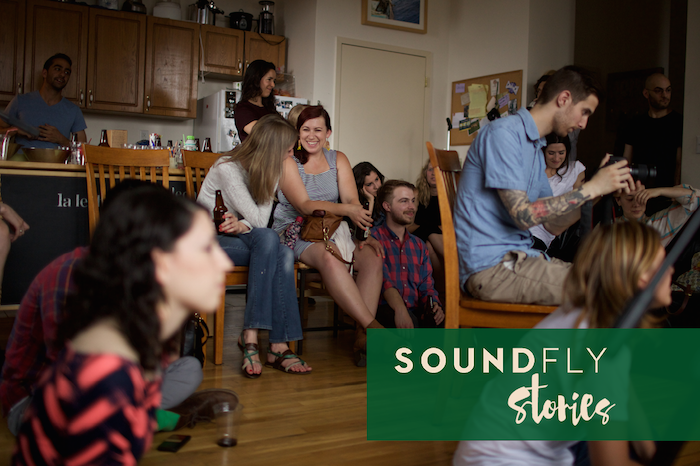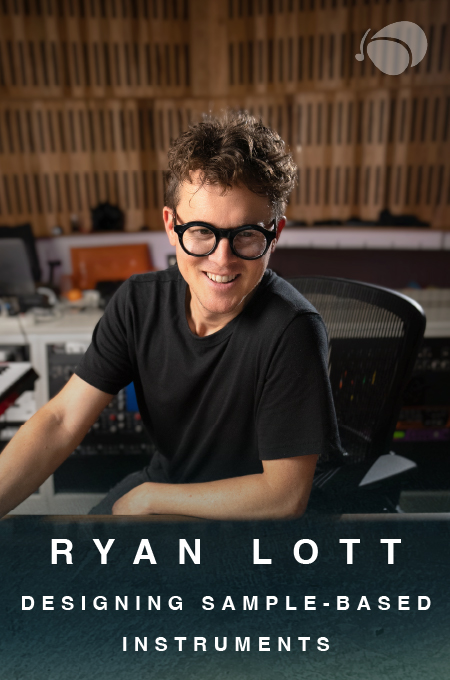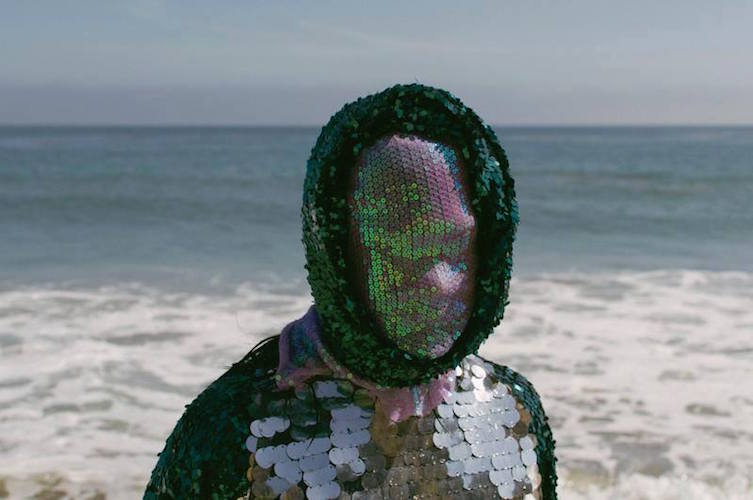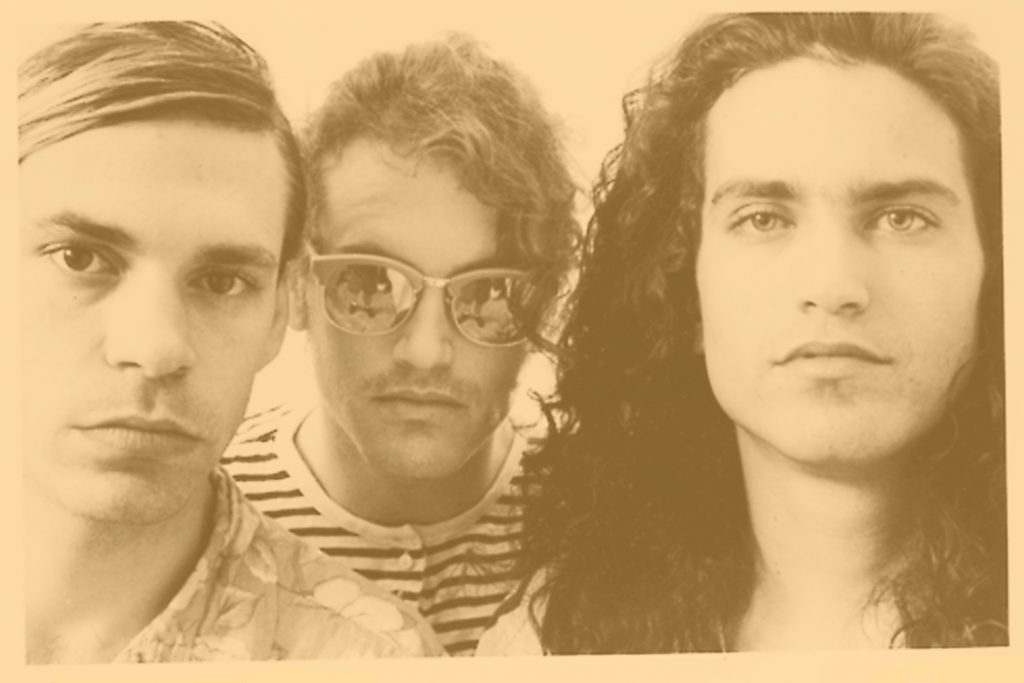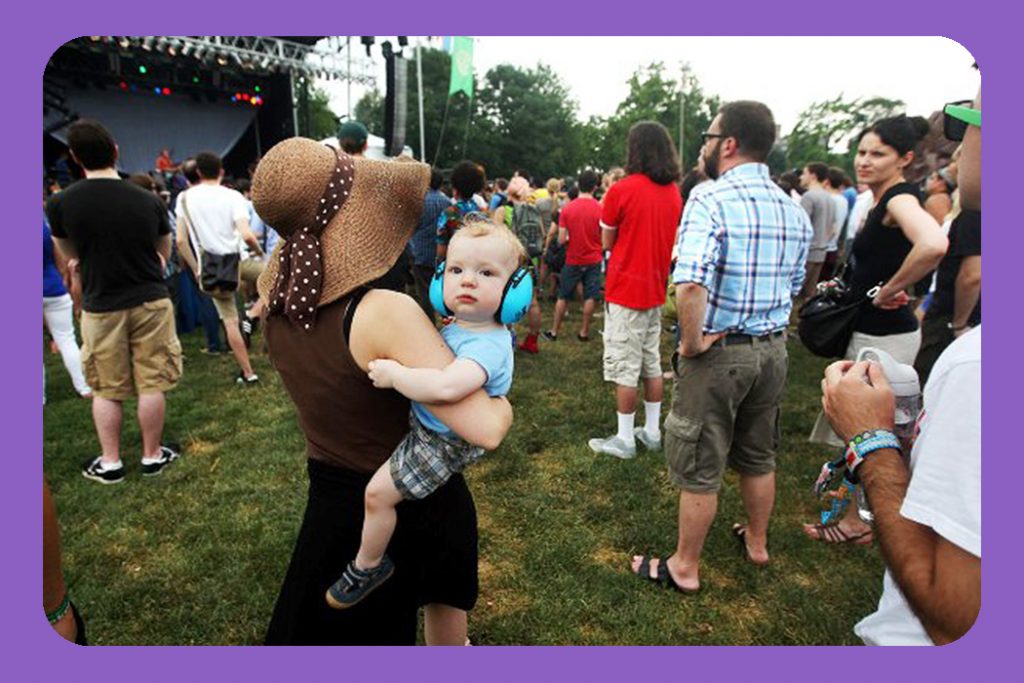Sergio Carrasco, Malik Fakiri (Faki), and Ariel Utin are the co-founders of La Leche, a Brooklyn-based production company that hosts the “Hangover Sessions” — an intimate and inspiring performance series on Saturday afternoons. I caught up with Ariel recently to ask about some of her most memorable performances, how to write songs listeners love, and how to cultivate a musician-supportive audience.
Where did the idea for the Hangover Sessions come from?
Faki wanted to do a series with musicians. We came up with the idea of hosting small, intimate concerts and interviewing artists. I volunteered my apartment as a space. We didn’t want to bother the neighbors on a weekday or in the evening, so we decided on Saturday afternoons. Sergio came up with the name “Hangover Sessions”, which perfectly sets the vibe for acoustic, low-key, mid-day performances.
We were simultaneously working on a bunch of different documentary-style video series, but this one really stuck. I think that’s because we weren’t just making videos, we were starting to build a community around local musicians.
In Brooklyn, we’re surrounded by amazing musicians who spend a lot of their time playing gigs where the conditions are less than ideal. The more sessions we do, the more we understand how special it is to really get to know the people behind the songs. This kind of experience should be available to anyone who loves music.
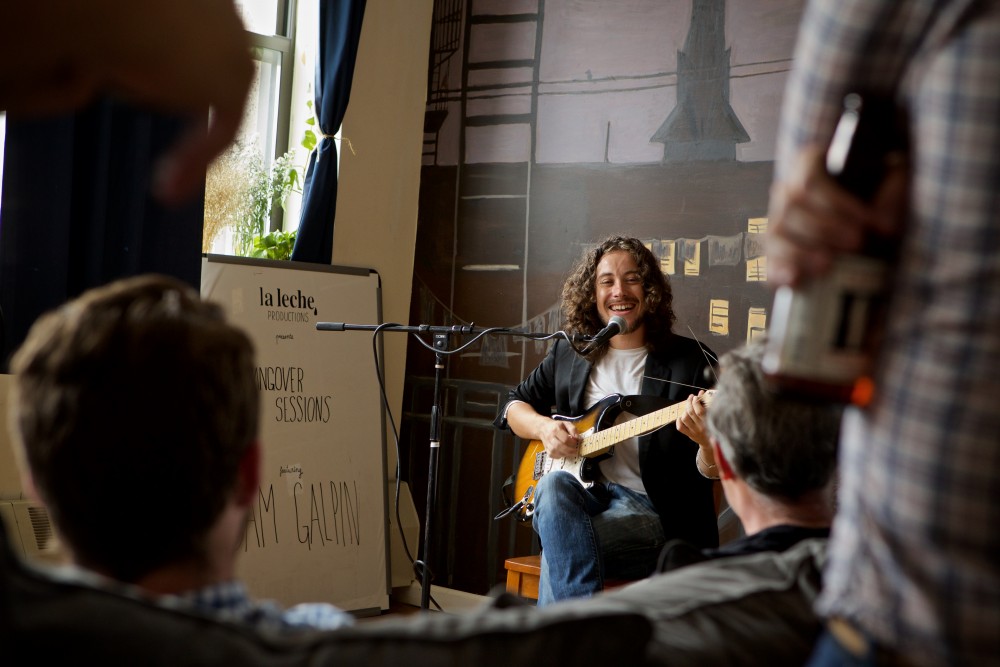
What are a few qualities you look for in a songwriter/performer before reaching out to them?
If we had three buzzwords for our ideal performer, they would be “local, relatable, quirky.”
We’re all about storytelling, so the more we can learn about an artist through a song, the more likely we’ll be to reach out.
There’s something very unique about musicians in New York. It’s a difficult place to stay above water, especially as an artist, and that’s why it’s so important for us to bring musicians into a safe place where people are going to listen, and give honest feedback. The way performers sound in a quiet, intimate setting is so much more authentic than at a bar or bigger venue.
What are some of the most memorable moments from Hangover Sessions so far?
The times artists tell anecdotes about the songs before before playing them. They’re unexpected moments that help you connect to the music on a deeper level. It’s so valuable to know the writer’s true intention behind a song.
Before playing the song, “Carroll”, Ken Lamken (of Beecher’s Fault) told us it’s one of the most personal songs he’s ever written. It’s about his grandfather reflecting on losing his wife. He then told us that it recently got placed in a movie, and they found out after the fact that it was played over a sex scene. He said that was the first time they found a huge contrast between the meaning of a song they had written and where it ended up going.
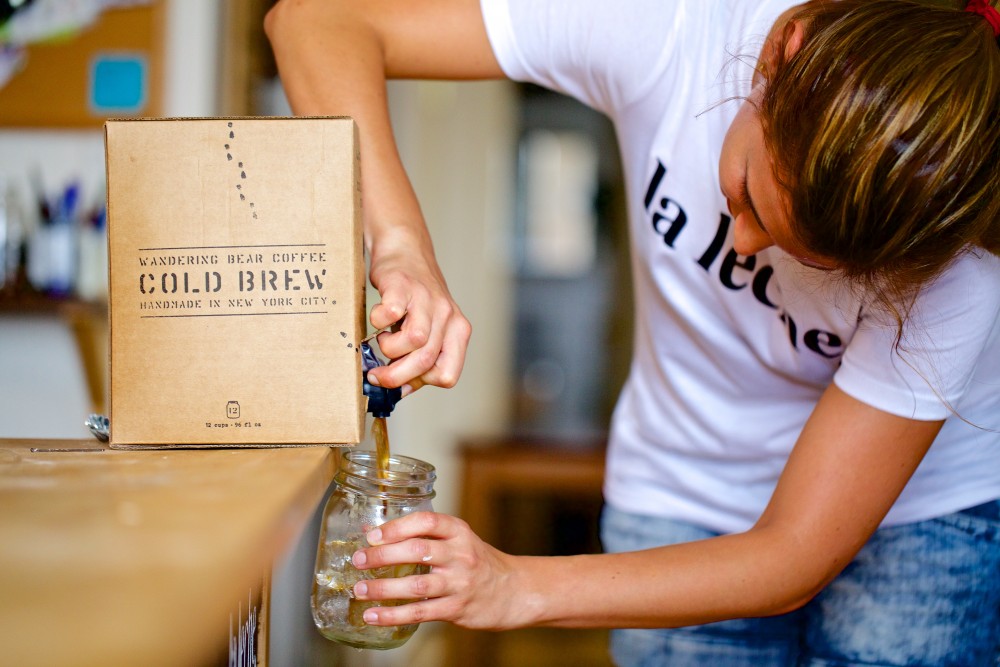
What are some interview answers that really stood out?
One of our favorite questions is “what odd jobs have you taken to support your career as a musician?” and we’ve gotten pretty crazy answers. Cariad Harmon told us she was a chamber maid at a hotel for a while. “I cleaned a lot of funky shit,” she told us.
Maya Solovey told us she was a nude model and a belly dancer when she moved to New York, and she once played a gig naked in an exclusively female audience. “All of them were already naked” she said, “so I figured I’d join the bunch.”
These responses give us insight into the strange phases these artists go through. I think these weird experiences allow them to write the way they do.
Do you feel that covers get a different response than original songs?
Bandits on the Run covered Amy Winehouse’s “Back to Black” and got amazing audience feedback. When done right, covers can help an audience pick up on an artist’s unique sound, because they have something to compare it to.
Usually, covers are just fun. They give audiences a little break, because listening to new music takes more effort. Our brains are processing the lyrics, the melody, and constantly forming new opinions.
Although a few covers are great for a live show, we try not to release them online because we really want to emphasize the artist’s individual voice. Lyrics are so important to us. We want to expose the stories behind the songs, to really get to know the artists that come to our sessions.
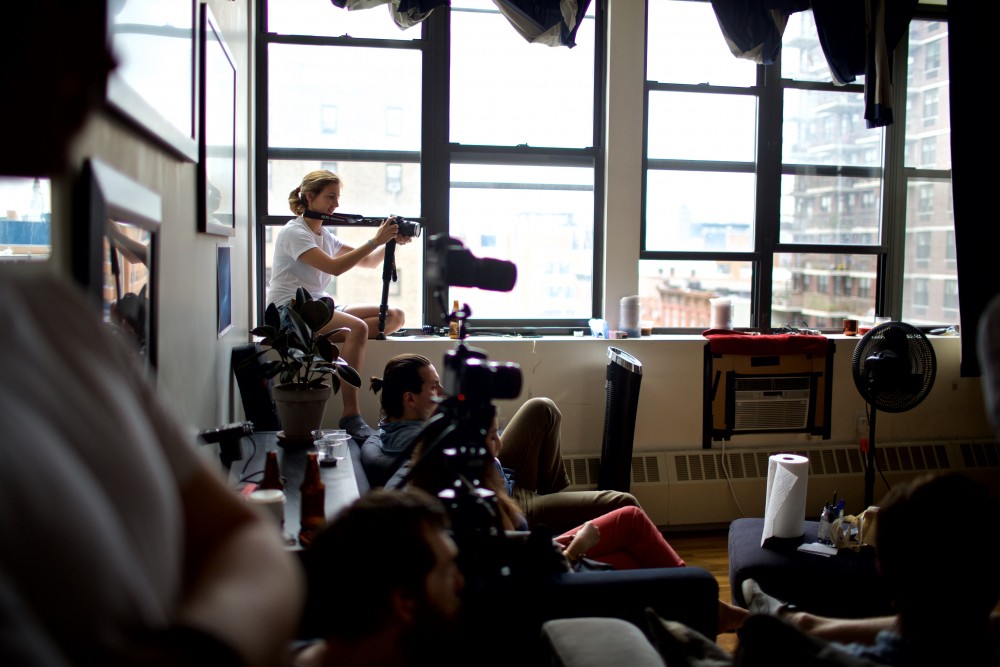
Who are some of the performers that the audience really connected with?
Maya Solovey’s show was the first one where audience interaction was key to the performance. She weaved in conversations with some Hangover regulars into many of her songs and got us all singing along with her.
It may have been a little awkward at first, but it also gave us a taste of how hard it is to put yourself out there. The small setting is a bit more intimidating sometimes, because you’re so aware that people are listening and looking at you. Maya made eye contact with every audience member individually and kind of put the viewer in her seat for a few seconds.
What do you think audiences can do to better support songwriters?
We encourage people to have conversations with the artists. We’ve always done interviews after performances, but we recently started having audience members write the questions. Band members read them out loud and answer them. It’s a way to get everyone engaged and feeling connected to the musicians.
I’ve learned that a lot of extremely talented musicians are insecure — even the ones that have an amazing stage presence. I asked Fin-Folsom when they felt like they were “good enough,” and Conor Walsh (who writes all the songs) said, “I don’t think we’re there yet. Honestly, the feedback people give means a lot because I don’t know what’s good and what’s not.”
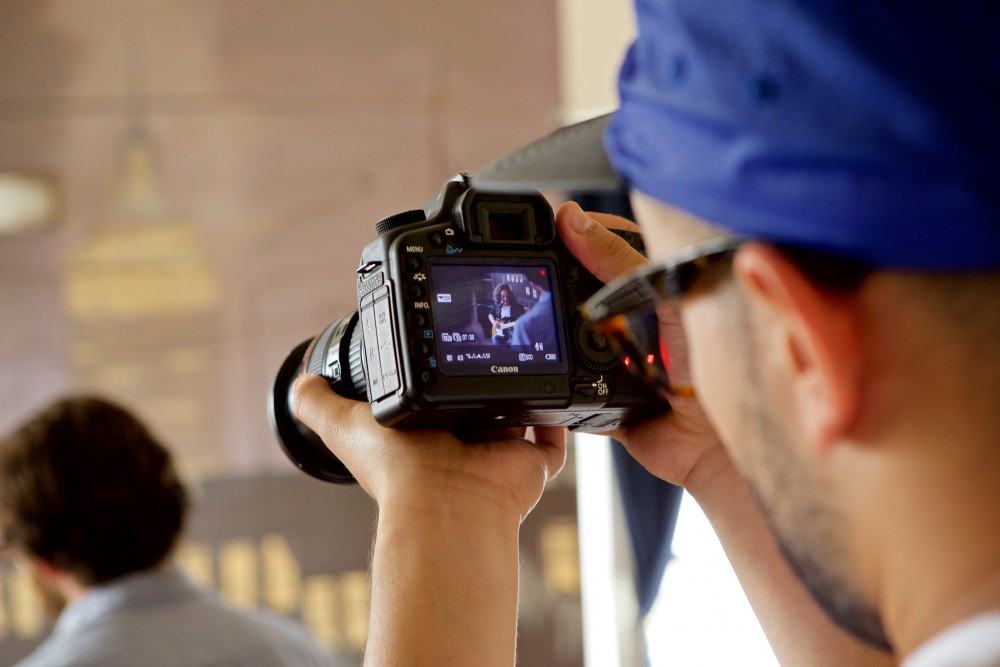
How do you know when you hear a great song?
It’s super subjective and has to do with so many outside factors. Liking a song can be tied to where you were when you first listened to it, what you listened to growing up, how you’re feeling at that exact moment…
It’s not right to pass judgment on a song based on just one listen.
Sometimes when something is too easy to listen to, too easy to love, it can also be very easy to eventually forget. I think great music comes out of effort, both on the writing and the listening sides.
I’ve listened to a lot of independent bands to see what works for our sessions, but we’ve had the most success by booking people we clicked with on a deeper level than just their sound.
Good songs come out of genuine people — people who are writing because they have to, and not to please others. Weirdly, for Hangover Sessions, we’ve often gotten to know the songwriters before hearing any of their songs.
Learn more about La Leche and Hangover Sessions here.
Be sure to subscribe to their YouTube channel and sign up for their email list to stay up-to-date and find out about upcoming events!
